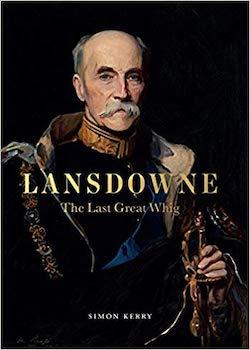Lansdowne: The Last Great Whig

By Simon Kerry
Unicorn (2017)
ISBN-13: 978-1910787953
Review by Antony Best
Associate Professor in International Politics, London School of Economics
The 5th Marquess of Lansdowne was one of the most important political figures of his age. Between 1883 and 1917 he was a constant figure in British imperial, foreign and domestic politics, serving in succession as Governor-General in Canada, Viceroy of India, Secretary of State for War (during the first half of the Boer War), Foreign Secretary, and the Leader of the Opposition in the House of Lords. For those interested in Japan he is best known as the Foreign Secretary who negotiated for Britain in talks that led to the Anglo-Japanese alliance. Despite this stellar career, Lansdowne has been comparatively ill-served by historians. In 1929 a biography was written by Lord Newton but since that date there has been no overview of his life, despite the attention paid to his contemporaries, such as Lord Salisbury, Arthur Balfour and Sir Edward Grey. The book under review, which is written by one of Lansdowne’s descendants, is an attempt to fill this gap.
In this volume Simon Kerry has had the advantage of being able to draw on the large collection of Lansdowne papers that have recently been deposited at the British Library. Combining these with a thorough combing of other archival sources both public and private, he presents us with a fuller picture of the 5th Marquess than we have ever had to date. As the title of the book suggests, Kerry sees his forebear as a man primarily shaped by Whig values. Lansdowne is thus presented as a pragmatic figure devoted to public service and the common good, but one who found himself challenged by the increasing radicalism and rapid social change of the period. Kerry clearly admires his ancestor and the reader too may well be impressed by Landowne’s devotion to duty and to his reasoned and reasonable approach to politics. Some may even be led to lament that we no longer seem to have such figures of balance and authority who are willing to contribute so eminently to public life.
Kerry recognizes, though, that Lansdowne did make errors, none more so than his rejection of Lloyd George’s ‘People’s Budget’ of 1909 which helped to spark a two-year long constitutional crisis. Kerry is not, however, willing to criticize Lansdowne for the most controversial act of his political career; the ‘peace letter’ that he sent to the Daily Telegraph in November 1917. Kerry sees this as a profoundly moral act that had beneficial consequences in that it forced the Allies into a more open debate about war aims and helped to influence some of the more positive thinking that would emerge over the following two years. This is an interesting point, but not one that this reviewer is particularly well-placed to interrogate.
In regard to British relations with Japan, Kerry does not deviate much from what is already known from the work of Ian Nish. He rightly observes that Lansdowne was more flexible than his predecessor as Foreign Secretary, Lord Salisbury, and that he skilfully handled the various questions raised by his Cabinet colleagues as the alliance moved towards its conclusion in late 1901 and early 1902.
Where one might differ from his interpretation is in his assertion on p.157 that Lansdowne always knew that there was a risk of Japan’s going to war, while others believed the alliance would force Russia to retreat and thus negate the chance of conflict. It is probable, although not clearly stated, that Kerry’s stance is based on the letter that Lansdowne sent to King Edward VII in 1904 in which he made a claim along these lines. But a letter two years after the act does not necessarily indicate what one felt at the time; certainly Lansdowne’s argument in December 1903 that Britain should act to prevent war from breaking out makes him look less assured than Kerry would suggest. In addition, Kerry goes too far in taking the line that the decision to sign the alliance met with little opposition as foreign policy was approached largely from a bipartisan perspective.
The reality is that a notable section of the press had nothing good to say about the alliance and that behind the scenes a number of Liberal politicians were critical of the treaty, including Sir Edward Grey. This is important because in 1905 the Conservative perception of Liberal disdain towards Japan was one of the factors that persuaded Balfour, the Prime Minister, from an early resignation. The government was determined to negotiate and sign the second alliance with Japan before the Liberals came into power.
In conclusion, this book fills a significant gap in the literature. It works by not only providing a thorough and informative biography of an important political figure but also by shedding light on a fascinating if troubled period in our national life. It leaves behind the lingering impression of a reasonable man wrestling with strong forces in a rapidly changing and increasingly unfamiliar world.

